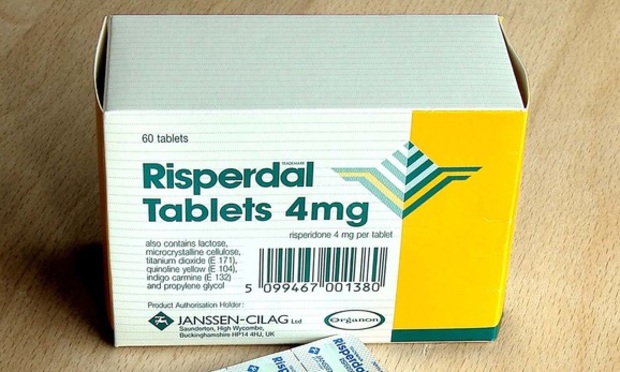Supreme Court Won't Review $2.5M Risperdal Verdict
The Pennsylvania Supreme Court has declined to hear a Johnson & Johnson subsidiary's appeal in the first Risperdal lawsuit in Philadelphia to result in a plaintiff's verdict.
August 05, 2019 at 02:39 PM
3 minute read
 Risperdal. Photo: Housed via Wikimedia Commons
Risperdal. Photo: Housed via Wikimedia Commons
The Pennsylvania Supreme Court has declined to hear the appeal of a Johnson & Johnson subsidiary that was hit with a $2.5 million verdict over the drug Risperdal’s association with gynecomastia.
The state’s justices denied allocatur in Pledger v. Janssen Pharmaceuticals on Aug. 2.
The Pledger case was the first Risperdal lawsuit in Philadelphia to result in a plaintiff’s verdict.
The plaintiff, Austin Pledger, was represented on appeal by Kline & Specter. Firm co-founder Tom Kline said in an email Monday, “With the compensatory jury verdict affirmed with finality, we look forward to a punitive damages trial on behalf of an autistic child who was terribly injured by the misconduct of Johnson and Johnson.”
Of the court’s decision, a Janssen spokesman said only, “We are aware of the ruling.”
Previously, the state Superior Court upheld the $2.5 million verdict and sent the case back for the trial court to consider whether the plaintiffs should be able to proceed with punitive damages claims.
As part of its effort to overturn the verdict, Janssen focused much of its argument on the plaintiff’s experts, specifically contending that the lower court should have granted a mistrial after the plaintiffs sought to change experts midtrial.
According to Superior Court Judge Eugene Strassburger’s October 2018 opinion, the plaintiff’s first expert, a pediatrician and endocrinologist from Missouri, had examined Pledger in Alabama, and plaintiffs counsel initially sought to introduce the doctor’s testimony through a videotaped deposition. However, Janssen contended that, since the doctor was not licensed in Alabama, his examination of Pledger violated Alabama law. After Janssen’s motion, the doctor told the plaintiffs he was no longer willing to testify, so the plaintiffs had another doctor—the doctor who later testified at trial—examine Pledger.
Although Janssen called for a mistrial based on the switch, the trial judge rejected the drugmaker’s arguments, saying its accusation about the doctor was “extraordinary and seemed calculated for maximum surprise.”
Strassbuger agreed.
“Moreover, we conclude the relief granted by the trial court was appropriate under the circumstances,” Strassburger said.
After a monthlong trial, the jury in Pledger found that Janssen failed to warn of the potential for Risperdal to cause gynecomastia, a condition in which males grow enlarged breasts. Pledger, a 20-year-old from Alabama, took Risperdal, which is an antipsychotic, to assist with behavioral symptoms related to autism. The suit claimed the drug caused him to grow large breasts, beginning when he was 8 years old, and that—barring a mastectomy—the condition is permanent.
This content has been archived. It is available through our partners, LexisNexis® and Bloomberg Law.
To view this content, please continue to their sites.
Not a Lexis Subscriber?
Subscribe Now
Not a Bloomberg Law Subscriber?
Subscribe Now
NOT FOR REPRINT
© 2025 ALM Global, LLC, All Rights Reserved. Request academic re-use from www.copyright.com. All other uses, submit a request to [email protected]. For more information visit Asset & Logo Licensing.
You Might Like
View All
Ozempic Defendants Seek to Shave 'Tacked On' Claims From MDL Complaint
3 minute read
Plaintiff Argues Jury's $22M Punitive Damages Finding Undermines J&J's Talc Trial Win
4 minute read
'Discordant Dots': Why Phila. Zantac Judge Rejected Bid for His Recusal
3 minute read
Pittsburgh Jury Tries to Award $22M Against J&J in Talc Case Despite Handing Up Defense Verdict
4 minute readTrending Stories
- 1Big Law Firms Sheppard Mullin, Morgan Lewis and Baker Botts Add Partners in Houston
- 2Lack of Jurisdiction Dooms Child Sex Abuse Claim Against Archdiocese of Philadelphia, says NJ Supreme Court
- 3DC Lawsuits Seek to Prevent Mass Firings and Public Naming of FBI Agents
- 4Growth of California Firms Exceeded Expectations, Survey of Managing Partners Says
- 5Blank Rome Adds Life Sciences Trio From Reed Smith
Who Got The Work
J. Brugh Lower of Gibbons has entered an appearance for industrial equipment supplier Devco Corporation in a pending trademark infringement lawsuit. The suit, accusing the defendant of selling knock-off Graco products, was filed Dec. 18 in New Jersey District Court by Rivkin Radler on behalf of Graco Inc. and Graco Minnesota. The case, assigned to U.S. District Judge Zahid N. Quraishi, is 3:24-cv-11294, Graco Inc. et al v. Devco Corporation.
Who Got The Work
Rebecca Maller-Stein and Kent A. Yalowitz of Arnold & Porter Kaye Scholer have entered their appearances for Hanaco Venture Capital and its executives, Lior Prosor and David Frankel, in a pending securities lawsuit. The action, filed on Dec. 24 in New York Southern District Court by Zell, Aron & Co. on behalf of Goldeneye Advisors, accuses the defendants of negligently and fraudulently managing the plaintiff's $1 million investment. The case, assigned to U.S. District Judge Vernon S. Broderick, is 1:24-cv-09918, Goldeneye Advisors, LLC v. Hanaco Venture Capital, Ltd. et al.
Who Got The Work
Attorneys from A&O Shearman has stepped in as defense counsel for Toronto-Dominion Bank and other defendants in a pending securities class action. The suit, filed Dec. 11 in New York Southern District Court by Bleichmar Fonti & Auld, accuses the defendants of concealing the bank's 'pervasive' deficiencies in regards to its compliance with the Bank Secrecy Act and the quality of its anti-money laundering controls. The case, assigned to U.S. District Judge Arun Subramanian, is 1:24-cv-09445, Gonzalez v. The Toronto-Dominion Bank et al.
Who Got The Work
Crown Castle International, a Pennsylvania company providing shared communications infrastructure, has turned to Luke D. Wolf of Gordon Rees Scully Mansukhani to fend off a pending breach-of-contract lawsuit. The court action, filed Nov. 25 in Michigan Eastern District Court by Hooper Hathaway PC on behalf of The Town Residences LLC, accuses Crown Castle of failing to transfer approximately $30,000 in utility payments from T-Mobile in breach of a roof-top lease and assignment agreement. The case, assigned to U.S. District Judge Susan K. Declercq, is 2:24-cv-13131, The Town Residences LLC v. T-Mobile US, Inc. et al.
Who Got The Work
Wilfred P. Coronato and Daniel M. Schwartz of McCarter & English have stepped in as defense counsel to Electrolux Home Products Inc. in a pending product liability lawsuit. The court action, filed Nov. 26 in New York Eastern District Court by Poulos Lopiccolo PC and Nagel Rice LLP on behalf of David Stern, alleges that the defendant's refrigerators’ drawers and shelving repeatedly break and fall apart within months after purchase. The case, assigned to U.S. District Judge Joan M. Azrack, is 2:24-cv-08204, Stern v. Electrolux Home Products, Inc.
Featured Firms
Law Offices of Gary Martin Hays & Associates, P.C.
(470) 294-1674
Law Offices of Mark E. Salomone
(857) 444-6468
Smith & Hassler
(713) 739-1250





